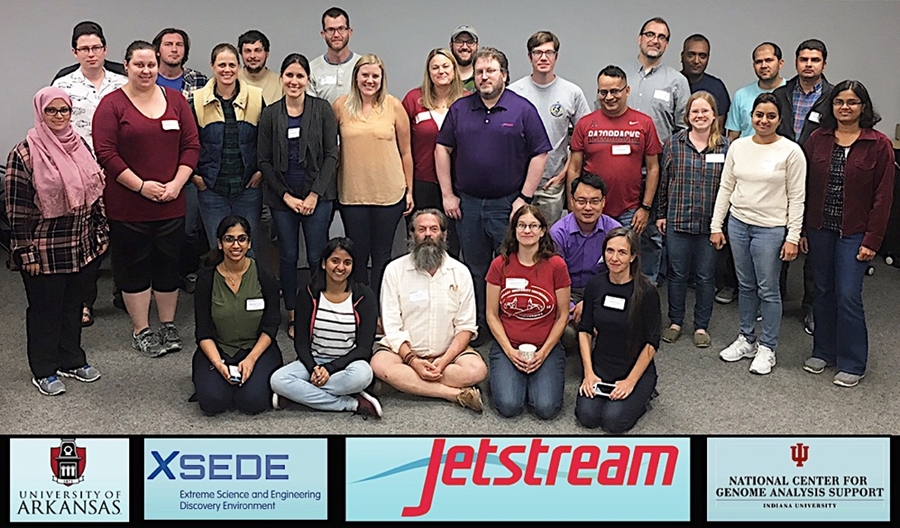JetStream is a cloud computing resource supported by the National Science Foundation as a component of the Extreme Science and Engineering Development Environment. Jetstream is the first STEM-research cloud with an application base that extends across all areas of NSF-supported activity.
As such, it is hosted at Indiana University, Bloomington and University of Texas, Austin (portal.xsede.org/jetstream). A primary focus of Jetstream is to promote ease-of-use and broad accessibility, and to do so across a diverse user-community.
Jeff Pummill, director of strategic initiatives and user services for the Arkansas High Performance Computing Center, and Marlis and Michael Douglas, endowed professors in biological sciences, organized an on-campus workshop Sept. 11-12 to demonstrate the research applications of Jetstream for the U of A community.
The workshop was held at the Engineering Research Center and was attended by 30 faculty, staff and graduate students. The primary focus of the workshop was to apply bioinformatic tools in the analysis of genomic data within the Jetstream environment. "Genomics" in the broad sense is a rapidly growing research field at the U of A, but it requires substantial amounts of high-performance computing resources including runtime, data storage and analytical expertise. However, graduate students and faculty with applied research interests often demonstrate diverse capabilities with regard to the manipulation of very large genomics data sets, i.e. "big data."
The Jetstream environment makes high-performance computing resources accessible by allowing users with limited super-computing background to establish virtual machines, into which they import project-specific programs and computational tools for their analyses. In this way, the virtual machines are configured with only the software needed for a project or collaboration, with the exclusion of extraneous programs or software packages that can absorb limited resources. The virtual machines remain viable for as long as the user is affiliated with Jetstream.
The workshop was led by staff from both Indiana University's National Center for Genomics Analysis Support and the Jetstream Project, and instructors presented several components, including "introduction to Jetstream," "how to develop a user interface," "application of Jetstream for analysis of RNA-transcriptomic data" and "Jetstream as a host for metagenomic analyses."
The feedback from the U of A research community was enthusiastic, as evident from comments provided post-workshop:
- I was impressed with the overall Jetstream atmosphere user interface, and how users can create support cases within this interface.
- The workshop clearly demonstrated the usefulness of Jetstream /cloud platforms vs. traditional HPC for people in fields like ours.
- This was a fabulous workshop and will be super-helpful for my research. I am very glad that I attended this workshop and found out what Jetstream can do. I would definitely try Jetstream to analyze my metagenomic and transcriptomic data in the very near future.
- I was able to get space allocation for cloud computing in Jetstream for at least one year.
- I appreciated the workshop and I can see myself using Jetstream in the future.
JetStream allocations are available at no cost through the NSF Extreme Science and Engineering Development Environment Program (http://xsede.org). The workshop was supported in part by Pummill (as XSEDE campus champion), and sponsored by two endowments in the J. William Fulbright College of Arts and Sciences: the 21st Century Chair in Global Change Biology (Michael E. Douglas) and the Bruker Professorship in Life Sciences (Marlis R. Douglas).
Contacts
Michael Edward Douglas, professor
Department of Biological Sciences
479-575-6343, med1@uark.edu
Bob Whitby, feature writer
University Relations
479-575-4737, whitby@uark.edu
